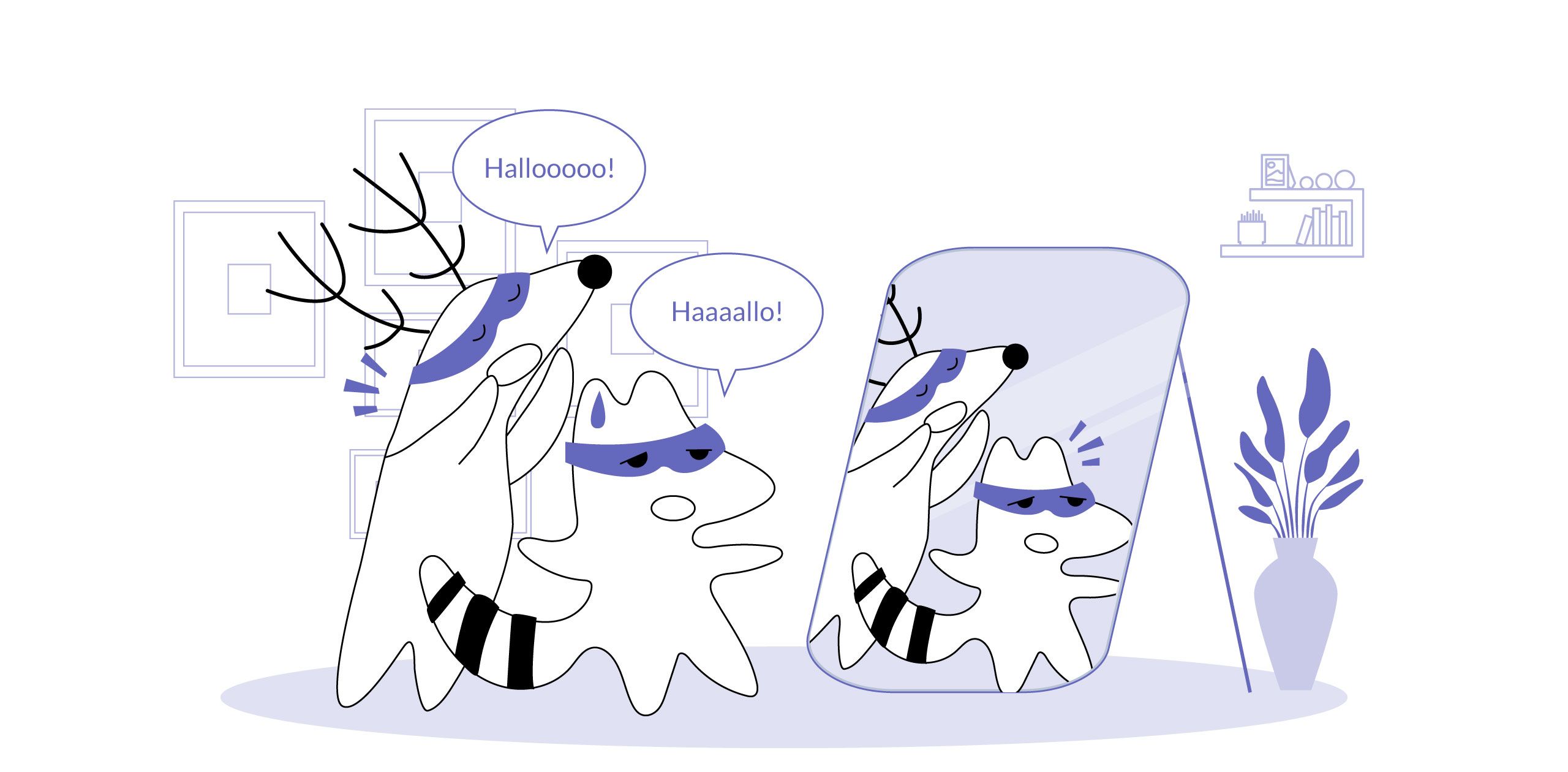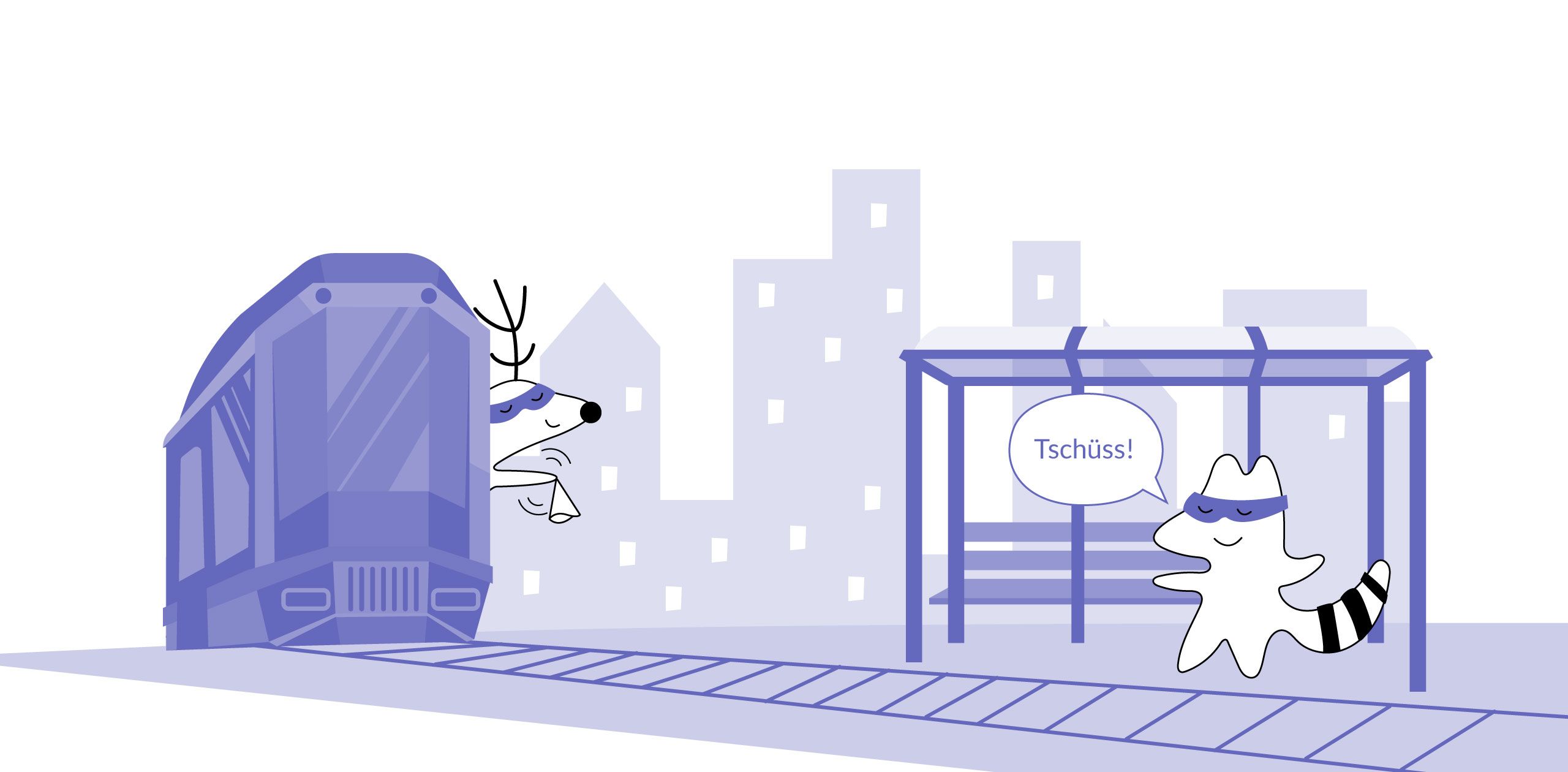
Visiting a foreign country without knowing the language can be challenging, but locals are usually willing to assist you with whatever you require. This is especially true if they notice you making an effort to learn the language in order to get around the country.
If you plan to visit Germany, you will notice that by simply saying "hello" or "goodbye" in German, you can begin to warm the locals' hearts and get to know people. Local contacts are beneficial to learning a language as daily conversations improve language learning.
In a previous article, we already showed you how to say "hello" in German as well as some other German greetings, so this post will focus on saying "goodbye" in German.
Just like in English, there are numerous ways to say "goodbye" in German due to the language's rich vocabulary. We will introduce you to several German farewells as well as a variety of words and phrases to practice, so you can choose what works best for you.
Learn German with Langster
1. The Standard Farewells in German
In German, the two most common ways to say goodbye are "Tschüss" and "Auf Wiedersehen." Although some people use those words randomly, they have different meanings, which we will now have a closer look at.
Both farewells you can use both in a casual and in a formal way. While other German-speaking countries have their variants of "Tschüss," the phrase "Auf Wiedersehen" is used among all German speakers.
"Auf Wiedersehen" as the Formal German "Goodbye"
The phrase "Auf Wiedersehen" seems pretty long and complicated, and you might prefer using a shorter “goodbye.” Nevertheless, it means "until we see each other again” - and, if you ask us, that is pretty lovely. Besides, if you want to learn German, you better get used to long words - this language is known for its word combinations.
When someone uses the farewell "Auf Wiedersehen" (until next time), they generally expect to see the other person again. It can be either the case of knowing when they’ll meet next or they’re just hoping to see the other person again.
German
English
Auf Wiedersehen.
Until next time.
Saying "Goodbye" in German via the Telephone
The funny thing is that German people use a similar farewell when they talk on the phone. They obviously don't see each other while talking on the phone, so they say, "Auf Wiederhören. "
While the verb "wiedersehen" means "see again" in English, "wiederhören" means "hear again." As a result, the translation would be "until we hear each other again" and implies that you either know or hope to hear from the other person again.
Many people also use the phrase "Wir sprechen uns" to say "goodbye" in that context as it means you will talk again on the phone soon. The direct translation is "we will talk with each other."
German
English
Auf Wiederhören.
Goodbye (on the phone).
Wir sprechen uns.
We'll talk soon.
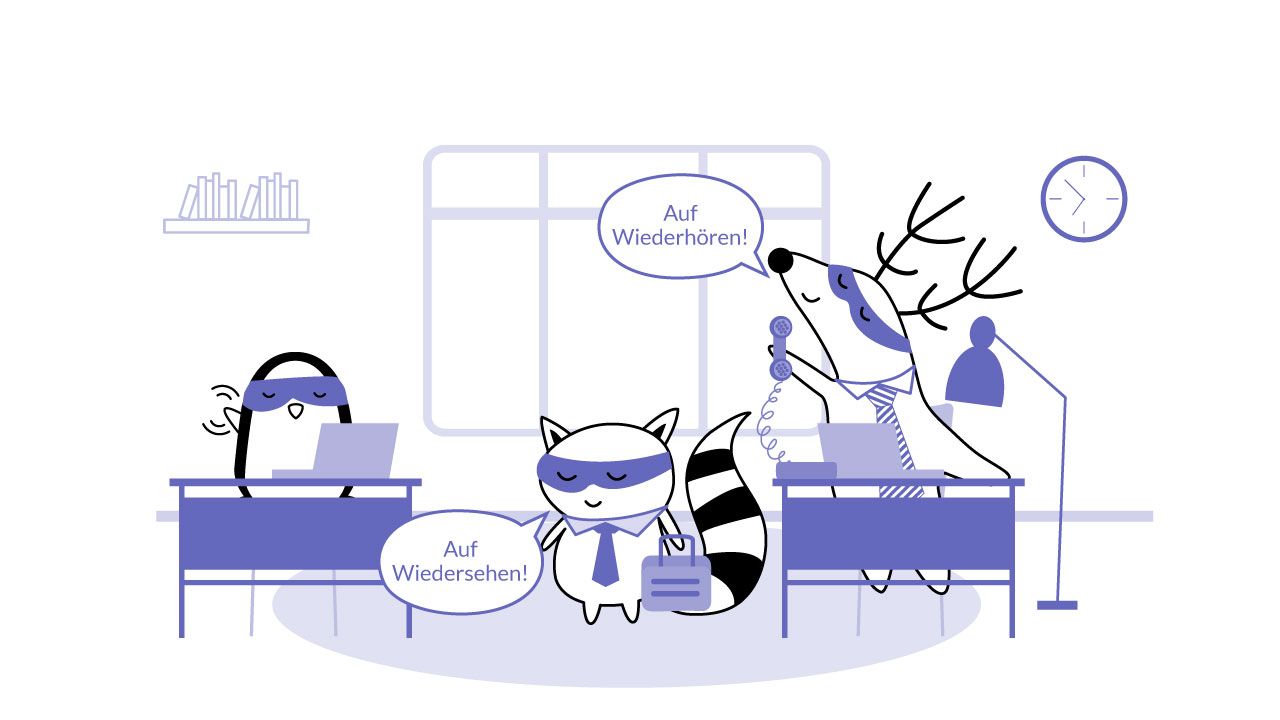
"Tschüss” as the Shortest Way to Say "Bye" in German
The second standard farewell, "Tschüss," is probably the most commonly used farewell in German. It comes from the word "atschüss," derived from Latin. There are many similar words in the Romance languages, such as "adios," "adieu," "adeu," or "adé," all of which mean "God."
The English translation of "Tschüss" is "goodbye," which has its origin in the old phrase "God be with you." Nowadays, the religious influence of "Tschüss" has become minor, but it is still the most used farewell in several languages.
German
English
Tschüss
Bye
In the German language, there is also some variation depending on the region you are in. While people say "Tschö" in some areas, in the Eastern Germany, they use "Tschüssi," which actually makes the farewell sound a little sweet.
2. Wishing a Nice Day in German
Another way to say "goodbye" in German is by wishing someone "einen schönen Tag" (have a nice day). In this context, the most common phrase in Germany is "Schönen Tag noch," which means that you wish the other person a pleasant rest of the day.
The word "noch" literally means "still," but in our case, it is used to say "the rest of the day." If it is already later in the day, Germans change the sentence to "Schönen Abend noch," which means "nice evening."
German
English
Einen schönen Tag.
Have a nice day.
Schönen Tag noch.
Have a nice day.
Schönen Abend noch.
Have a nice evening.
Special Wishes for the Weekend
If the weekend is about to start, you also have the option to say "Schönes Wochenende," which means "have a nice weekend" in English. At the office or in school, this is a widespread way of saying goodbye on Fridays.
It’s also a pretty formal way to say goodbye in German. While you are leaving school and saying "see you later" (bis später) or "see you tomorrow" (bis morgen) to your friends, try to wish your teacher a "Schönes Wochenende."
German
English
Schönes Wochenende.
Have a nice weekend.
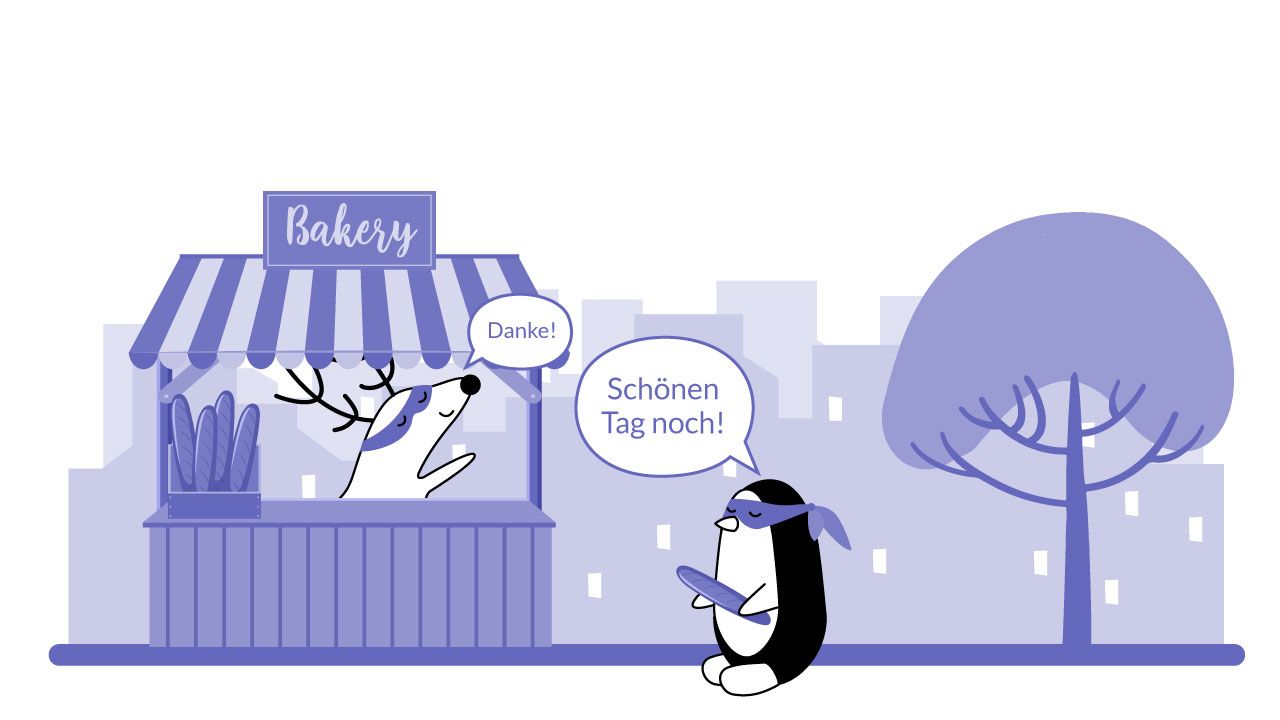
3. Saying "Goodbye" in German for a Short Time
If you only want to say "goodbye" in German and you know you'll see the other person again soon, you have several options. As in English, you can say "see you soon," which in German is "bis bald," "bis gleich," or "bis dann."
There are also the options such as "bis später" (see you later) and "bis zum nächsten Mal" (see you next time). As you can see, all of the phrases are built with the preposition "bis," which means "until" in English.
German
English
Bis bald.
See you soon.
Bis gleich.
See you.
Bis dann.
See you.
Bis später.
See you later.
Bis zum nächsten Mal.
See you next time.
Create Your Own “Goodbyes” in German With the Word "bis"
You can theoretically use the word "bis" to add any context you want. If you know you'll see the others on Monday, for example, you can say "bis Montag," which means "see you on Monday." It would be "bis morgen" (see you tomorrow) if you are going to meet tomorrow.
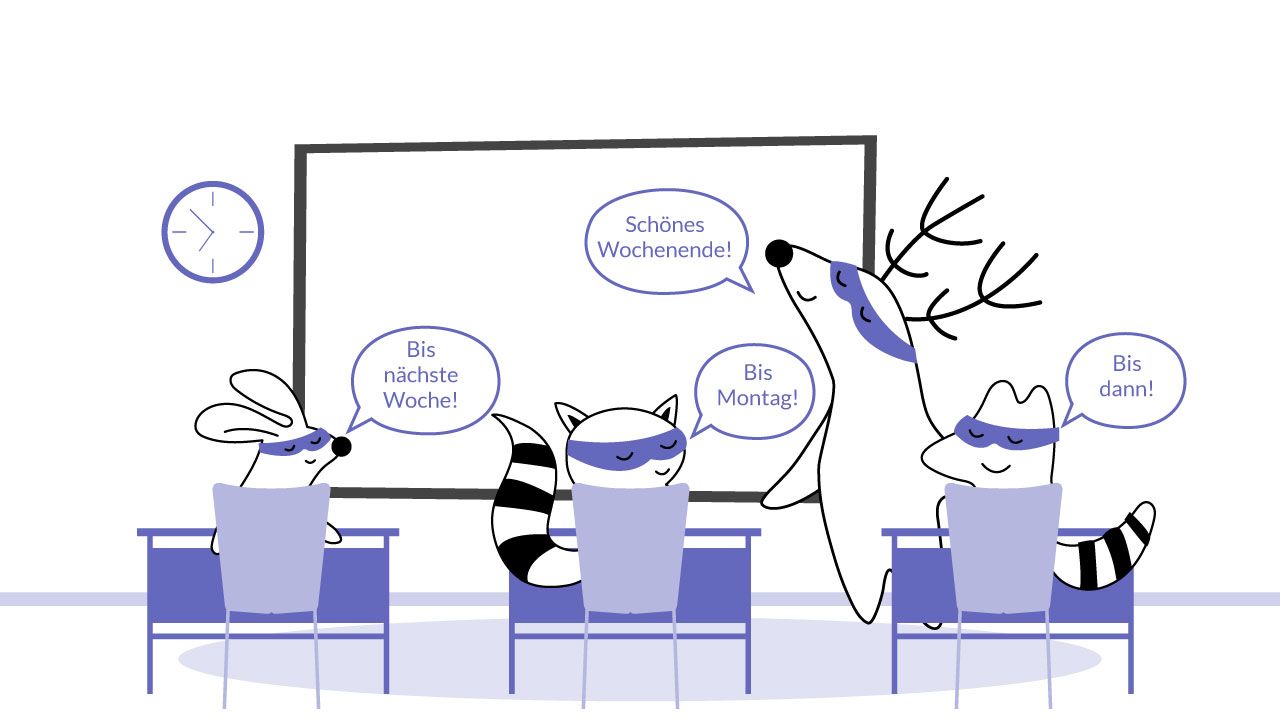
Apart from the sentence "wir sprechen uns" that we mentioned above, there is also a phrase "wir sehen uns" (we’ll see each other). While you would use the first one to refer to a next phone call, you can use “wir sehen uns” to propose a personal meeting in the future. You might be familiar with this phrase in Spanish, where they say "nos vemos" for it.
German
English
Wir sehen uns.
We'll meet later.
4. "Gute Nacht" for the Evening
We explained in previous posts that you can use "Guten Morgen" (good morning), "Guten Tag" (good day), or "Guten Abend" (good evening) as greetings in German. The phrase "Gute Nacht" (good night), however, you would only use as a farewell.
German
English
Gute Nacht.
Good night.
Most German speakers use it right before going to sleep when they are literally on the way to bed. As a result, you would not say it to your friends in a bar at night, but mostly when you are staying at their place before going to sleep.
5. A Traditional Way to Say "Bye" in German for Uncertain Time
Especially in earlier times, there were many instances where you couldn’t be sure if you would see each other again in life, and people said "goodbye" in a more formal way in German. By saying "Lebe wohl," they meant "Have a good life."
Nowadays, this farewell has mostly disappeared, as it is easy to keep in touch through social media. However, you might find older people in Germany using this way of saying goodbye.
German
English
Lebe wohl.
Have a good life.
If Germans are not sure about seeing each other again, but they hope so and trust in it, they use "Bis zum nächsten Mal" (see you next time) to say "goodbye," which we have already mentioned above.
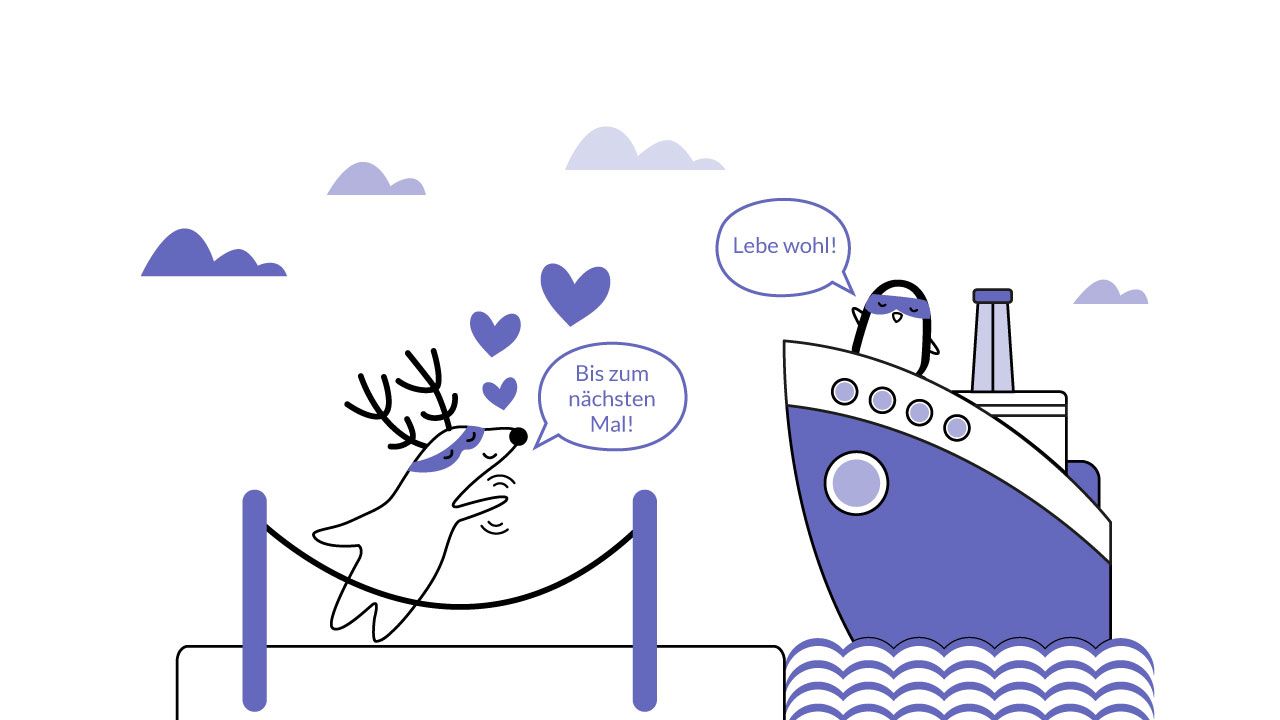
6. International Influence in Saying "Bye" in German
When visiting Germany, you might notice that many young people use words that are not German to say "bye" to someone. Because of the international influence, you can find words from many different languages in German.
One of the most common international ways to say "bye" in German is the Italian "ciao." Unlike the Italians, German people only use it for goodbye and not as a greeting. Besides "ciao," you will also find the English "bye," the French "adieu," or the Spanish "adios."
People use international words primarily for fun, so use them in a more casual context. For example, you might say "bye" using the word "ciao” after having a conversation with a neighbor you know well.
A Little Sum Up
Hopefully, this post showed you that there are numerous ways to say "goodbye" to someone in German - and from now on, you will always know which word to use in this context when visiting Germany.
Wish people a "schönen Tag noch" (a nice rest of the say day) when being in Germany and get in contact with the locals, or say "Wir sehen uns" (we’ll see each other) or "bis bald" (see you soon) when you know that you will meet up soon.
If you want to learn more about saying "hello" in German, or when to use "Guten Tag" (good day) and "Guten Abend" (good evening), check out our previous blog posts. And remember to practice - for example, with the Langster App.
Learn German with Langster






